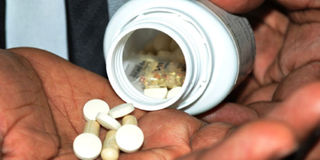Painkillers can reduce risk of skin cancer - study

Medicines such as aspirin and ibuprofen are commonly used to relieve pain and reduce inflammation. PHOTO BY RACHEL MABALA
What you need to know:
The drugs have previously been linked to a reduced risk of other cancers, including colon cancer. Experts said staying out of the sun and wearing sun cream were the most effective ways to avoid skin cancer.
The World Health Organisation (WHO)says currently, between two and three million non-melanoma skin cancers and 132,000 melanoma skin cancers, occur globally each year. One in every three cancers diagnosed is a skin cancer.
Taking painkillers such as aspirin and ibuprofen regularly may help protect against some forms of skin cancer, research suggests. An Australian analysis of various studies found non-steroidal anti-inflammatory drugs (NSAIDs) reduced the risk of squamous cell carcinoma by 18 per cent.
The drugs have previously been linked to a reduced risk of other cancers, including colon cancer. Experts said staying out of the sun and wearing sun cream were the most effective ways to avoid skin cancer.
The theory that NSAIDS such as aspirin may protect against skin cancer has been raised before, but the overall evidence had been unclear.
Researchers did an analysis of nine studies, looking at use of the drugs and the risk of squamous cell carcinoma, the most common form of skin cancer. Reporting in the Journal of Investigative Dermatology, the researchers found that taking any NSAID was associated with an 18 per cent lower risk of developing the cancer.
And taking NSAIDs other than aspirin was linked with a 15 percent reduced risk.
Side effects
But experts still cannot be sure of the effects because some factors - such as how much sun someone is exposed to or even what doses of the drugs they take - have been difficult to pin down with any accuracy.
The study reveals that NSAIDs, which also include diclofenac, may prevent skin cancer because they inhibit an enzyme called COX-2, which is involved in tumour development.
The researchers found a reduced risk associated with the use of the drugs in people with pre-cancerous growths or a history of skin cancer. It raises the possibility that the drugs could be used as a preventive treatment for some people.
Some people are prescribed NSAIDs for conditions such as arthritis, but they are not recommended for regular use in healthy people because of side effects, which can include bleeding in the stomach.
Prof Dorothy Bennett, an expert in cell biology, at St George’s, University of London, said the results were worth knowing about.
But the drugs’ side effects would likely prevent their routine use in everyone. “Noting that most (squamous cell carcinomas) are curable by surgery if caught early, this reduction in risk is interesting, but it is hard to say whether it is worth taking action over it,” said Bennett.
Prof Brian Diffey, at Newcastle University, said reducing the risk of skin cancer by the same magnitude seen in the study could be done with a small reduction in sun exposure. “Given that long-term therapy with NSAIDs is not without risk, a safer option for those who wish to reduce their likelihood of skin cancer may be to spend a few minutes a day less outside.”
WHO IS AT RISK?
There are several conditions that could increase a person’s risk of developing skin cancer.
•People with fair skins and red hair are more susceptible to developing skin cancer compared to their dark-skinned and haired counterparts.
•Those with lowered immunity such as those living with HIV/Aids, whose white blood cells are too weak to fight diseases and germs may develop skin cancers from wounds which take long to heal.
•Genetic factors especially for people who suffer from conditions that impair their DNA mechanism may find it difficult to fight skin cancer.
-BBC




